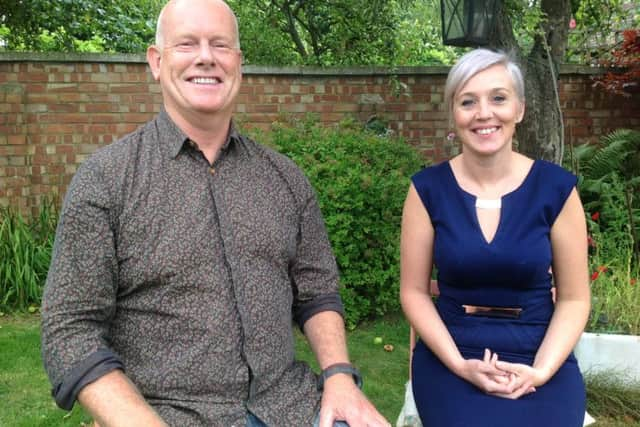Meet the man bringing mindfulness to Yorkshire


Dr Mike Scanlan isn’t promising to provide us with a stress-free existence. But then he wouldn’t want to.
“We need stress,” he says in just the sort of calm, measured voice that’s tailor-made for the stressbusting web-based seminars he delivers on a weekly basis. “Stress can be motivating. The trouble is that we can have too much of it and it then becomes paralysing.
Advertisement
Hide AdAdvertisement
Hide Ad“We begin to feel there is too much of everything in our lives and we start charging around manically, exhausting ourselves.”


Ask Scanlan, who has spent the last 20 years working with people battling to overcome anxiety, to name the biggest cause of stress and the answer is surprising, yet at the same time indicative of the self-inflicted angst that stalks so many of our lives.
“I can’t tell you how many people we’ve seen who say it’s Facebook,” he winces. “A lot of the time they say, ‘I look at my life and look at the lives of other people on Facebook and they all seem happier than me’.
“People have become so much more self critical about themselves and judgemental about how life should be, because they keep seeing an idealised version on television and social media.
Advertisement
Hide AdAdvertisement
Hide Ad“It’s all part of this striving for the myth that a life without stress is possible.”


Do you remember the feel of the toothbrush on your molars when you woke up this morning? The taste of that first spoonful of cereal? The sensation of the steering wheel spinning through your hands on the drive into work?
If not, you’re far from alone in failing to practise mindfulness, the art of living in the moment that’s credited as the path to a less stressful existence.
It’s at the heart of the eight-week course put together by Scanlan for Stressbusters, an initiative designed to help those in Leeds get to grips with their worries.
Advertisement
Hide AdAdvertisement
Hide AdA method of mental relaxation, mindfulness has found favour with celebrity fans including Goldie Hawn, Ruby Wax and, it goes without saying, Gwyneth Paltrow.
Devotees claim it not only calms them down but can also treat depression and boost creativity. Some say mindfulness can even extend life expectancy by teaching us to combat negative thoughts and achieve inner peace.
The father of modern-day mindfulness is Jon Kabat-Zinn, who developed a stress reduction programme in the US in the late Seventies to help patients with chronic pain, high blood pressure, cancer and cardiovascular disease.
But it’s in the last couple of years that it’s really caught on. There are countless mindfulness phone apps on the market and the National Institute for Health and Clinical Excellence now recommends mindfulness therapy sessions for people who have experienced three or more episodes of depression. So what exactly is it?
Advertisement
Hide AdAdvertisement
Hide AdScanlan summarises mindfulness as the ability to be in the present, to live each moment as it occurs – without judgement and with no sense of striving for something else.
“It’s about being more aware and more fully present. It’s easy to find an experience isn’t quite right in some way, perhaps it’s not good enough or not what we expected.
“That’s because we’ve got into a real habit of always focusing on the stuff that isn’t quite right. That automatic tendency to focus on the stuff that isn’t great in our lives and make judgements about it means we get absolutely stuck.”
The answer is to calm our minds and silence the inner voice that can’t stop critiquing every aspect of our existence and concluding it comes up short.
Advertisement
Hide AdAdvertisement
Hide AdScanlan says we need to get better at ackowledging that, in the here and now, we’re actually dealing pretty well with whatever life throws at us.
He’s wary of the technique being portrayed as a panacea: “People are jumping on board and promoting it as a cure all for all the woes of human existence, which it isn’t.”
Nevertheless, he’s a firm advocate of the technique for combating stress and managing pain – and its claims are backed by studies carried out by mental health experts which point to regular mindfulness helping with stress, worry and lack of focus, as well as leading to greater peace of mind.
The route to mindfulness itself is centred on meditation – but you don’t have to sit cross-legged on the floor in the lotus position to feel the benefit. A typical meditation consists of focusing your full attention on your breath as it flows in and out of your body.
Advertisement
Hide AdAdvertisement
Hide AdThe idea is that this allows you to observe your thoughts as they arise in your mind and, little by little, to let go of struggling with them.
At the end, the hope is that you come to realise that thoughts are transient and, ultimately, you have a choice about whether or not to act on them.
“Most of it is about learning to use your breath to anchor your thoughts rather than them being pulled away on to lots of other things,” Scanlan says.
Again, it’s a view backed by science, with research finding meditation causes structural changes in the part of the brain monitoring focus and self-control.
Advertisement
Hide AdAdvertisement
Hide AdThe eight-week stressbusting course being made available in Leeds teaches simple meditation techniques to help clear the mind.
It’s run as a series of online seminars, allowing users to access help at their own convenience rather than wait for an appointment.
“It’s about trying to make stressbusting far more accessible,” says Scanlan, who works alongside therapist Sonya Terry.
“A lot of NHS treatments are during the day. If you’re a young mum, working or have a busy life, you don’t have the ability to access a course. We get about half the people accessing the webinar live each week and the rest use the recordings. It works really well.
Advertisement
Hide AdAdvertisement
Hide Ad“Leeds is being really forward thinking by pressing this more open approach. We’re looking to help people who feel they would be living happier, more meaningful lives if they were less stressed.”
As well as social media-induced anxiety, Scanlan says that all too familiar bugbear of work-related stress remains a major factor.
“Work-related stress is huge,” he agrees. “We asked people to think about the things they enjoyed most in their lives and then asked them how much time they spent doing those things.
“We found that people with work stress spent far more time thinking about work, which was totally out of kilter with the value of their work. They get home and don’t switch off, they just keep worrying about things.”
Advertisement
Hide AdAdvertisement
Hide AdAnd Scanlan says the mindfulness approach is paying dividends.
“We are seeing incredible results. People say it makes them much more aware of what makes them happy and what makes them stressed and unhappy.
“And at the end of the day, that’s what we’re all looking for, isn’t it?”